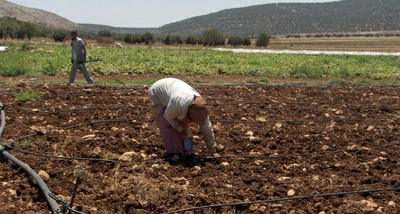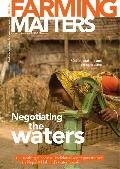We all use water: we drink it, use it to grow, process and cook food, to make other products and cool things down. Water also plays a key role in conserving nature: ecosystems depend on flows of water. The availability (and quality) of water is of concern to everybody. But different uses and different interests and priorities have led to many tensions, conflicts and scarcities all over the world. Water is a resource we need to care for, nurture, manage and govern. Doing so involves getting everybody around the water table.

Different scales, different stakes
We all have our own perceptions and ideas of what should take priority, and most of us find it difficult to consider the views of others. As the diagram shows, it is often difficult to see the two (or more) sides of the same situation at the same time. Dialogue is needed to recognise each other’s points of view, to jointly analyse problems, and come to shared solutions. This requires a process of negotiation in which all relevant stakeholders participate. This is particularly important when talking about the availability and use of water. Water resources are managed at different levels and scales, from the village level to a watershed, and from local to national and even larger scales. The articles in this issue of Farming Matters show how people are engaged in managing water resources at different scales. In the arid rain shadow region of the Himalayas of Nepal (page 10), local organisations maintain traditional irrigation systems. Auke Idzenga looks at the dissemination of low-cost technologies for pumping water uphill in the Philippines, focusing on the interactions required among stakeholders (page 26). In Guatemala (page 18) different actors have come together to improve watershed management, taking into account downstream and upstream interests.
Negotiating scarcity
The importance of bringing different actors together is especially clear in the countries of the Middle East, where I have worked for the last eight years. Different programmes for participatory planning and management of water resources have shown the importance of engaging in transparent, stakeholder-led, processes that cover these different levels and scales. For example, a process of stakeholder dialogue and concerted action (SDCA) in villages in Jordan, as part of the regional EMPOWERS programme, led to remarkable results. The governorate water department claimed that it provided 150 litres/person/day to villages in the Jordan Valley while, in reality, villagers only got 50 litres. Stakeholder dialogues between villagers and government officials resulted in the village taking the decision to take responsibility for eradicating the theft of water. The water department committed itself to repair the old and rusty pipes. Sufficient water now reaches the villages where such dialogue has led to concerted action.
In Palestine, the IUCN REWARD Programme worked with seven village committees and local government agencies to establish a Watershed Committee in the Marj Sanour watershed, which has since been endorsed by the Ministries of Agriculture and the Interior. This committee will help to ensure local responsibilities for managing the available water resources through soil conservation techniques, ground water recharge, flood prevention, and the combined use of ground and surface water. In other parts of the world, the IUCN Water and Nature Initiative (WANI) has been working in different transboundary water management programmes in West and Eastern Africa, the Mekong and Central America. Their eight-year experience has shown how important it is to jointly involve local communities and local authorities.
Facilitation, accountability and rights
Programmes like these show us that new technologies are not necessarily the most appropriate solution to water related problems. Enhanced collaboration and negotiating different interests between different parties is often more effective. Drip irrigation may be seen as a solution for problems related to inefficient water use. But bringing people together to analyse the real problems and explore shared solutions may deliver low-cost solutions that rely more on better organisation and task division. In many instances, tighter accountability for water management, and ensuring poor peoples’ rights and access, work better. Accountability and rights are both a key prerequisite and should be an integral part of all stakeholder negotiation processes.
There is an equally clear need to support negotiation processes through conducive policy and regulations. Many countries still need to do much in this area. Special efforts are needed to ensure that national water strategies take into account the multiple dimensions of water resource management, in a way that the interests of smallscale farmers are also taken into account. Fortunately, there are positive examples. In Egypt, for instance, EMPOWERS and REWARD have been working on a pilot scale in two water districts in the Nile valley on participatory planning processes, developing tools that have helped farmers and local government officials make appropriate decisions, agree on their implementation, and serve as example for up-scaling this to other 200 water districts.
Finally, the experiences of EMPOWERS, REWARD and WANI show that professional and transparent facilitation is an important key for success, especially when projects are run by people or organisations who do not have a direct stake in the outcome. This can be local development organisations when dealing with problems at the village level. At larger scales of operation, or when many actors are involved, experienced facilitators may be needed to provide credibility and impartiality. Such facilitation is an important way for empowering local communities and making negotiation possible.
Text: Peter Laban
Peter Laban lives in Ramallah, Palestine and works with the Al-Sahel Company for Institutional Development and Communications. For the last seven years he was the Regional Coordinator of EMPOWERS and REWARD programmes, implemented by CARE and IUCN in Egypt, Jordan, Palestine and Yemen. E-mail: p.laban@palnet.com
Photo: Farmers in Marj Sanour, Palestine, prepare for complementary irrigation. By: Buthaina Mezyed

